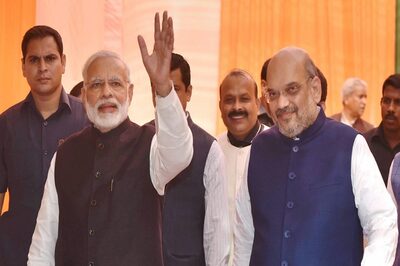
views
As countries across the world reel under the onslaught of the COVID-19 pandemic, UN experts called on governments to introduce Universal Basic Income (UBI) and cautioned that massive fiscal stimulus packages alone would not be tenable to fight the crisis.
“In the COVID-19 outbreak frenzy, several countries are considering massive fiscal stimulus packages and printing money, to blunt the concurrent crises underway: the pandemic and the unravelling economic depression,” said Kanni Wignaraja, Assistant Secretary-General of United Nations and Balazs Horvath Chief Economist, UNDP, Asia-Pacific in the The World Economic Forum's Agenda.
The experts believe that though these plans are essential, they aren’t entirely strategic. It is time, they said, for a fresh element to be introduced to the policy packages being implemented by the governments – Universal Basic Income.
“The naysayers, and there are plenty, will point out that it won’t work because no country can afford to regularly dole out money to every citizen. They will argue that we will run unsustainable deficits, which cannot be financed,” they said.
While they believe that the concerns are justified, the alternate route of not adequately addressing the COVID-19 fallout will lead to an increase in inequality, heightening social tensions in societies across the world.
The pandemic, which originated in China’s Wuhan, has wreaked havoc across the world, bringing to fore vulnerabilities of huge populations in the regions, Wignaraja and Horvath noted. This includes informal workers – approximately 1.3 billion people – and migrants, with close to 100 million displaced in India alone. If a significant chunk of a generation loses its livelihood, without a social safety net to protect it, the social costs will be insufferably high, they said.
“Economic instability will follow the flare-up of social tensions,” the experts said. In times like this, when it is imperative that “sputtering economies” be given a kickstart, they say that the reward of social stability will be enormous, making it an even more “powerful argument for UBI.”
Countries like United States and Canada are already creating similar plans, they added.
“Alaska, in fact, has been making annual UBI-type payments, to every state resident, for decades. Canadian prime minister Justin Trudeau pledged CAD$2,000 a month, for the next four months, to workers who have lost income due to the pandemic – a short-term form of UBI,” Wignaraja and Horvath noted.
Now, there is a need to broaden it and make it work in the long-run, they noted, adding that it is imperative that the concept now be dealt with differently from how it was done in the past. “We should neither view it as a hand-out, nor as a Band-Aid solution to add on to systems already in place,” the experts said.
To make UBI work, the experts said, will require fair taxation. “Countries will have to work together, exchanging data across borders, to stop people and corporations from evading taxes,” they said.
In other words, it is key that we all pay our bit. “With good conscience, we can no longer privatise profit and socialize loss,” they added.




















Comments
0 comment